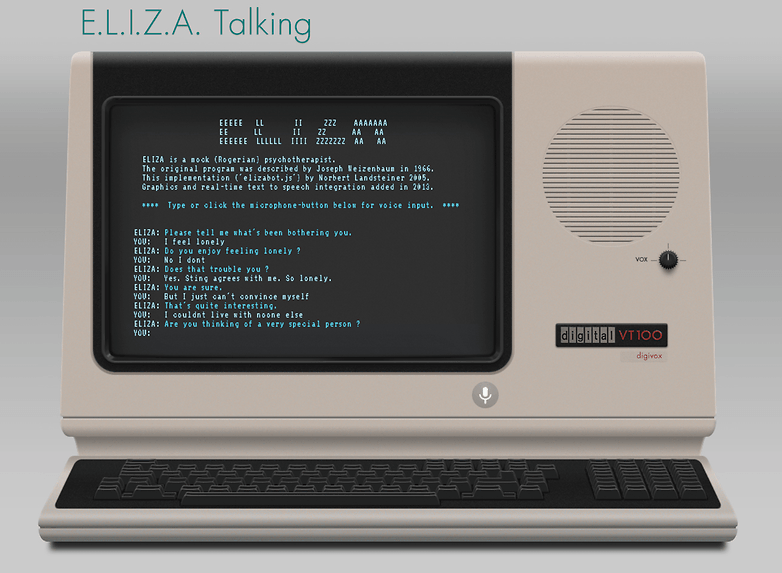#TBT - ELIZA: one of the first chatbots in history (1966)

Some names are destined to be forgotten, no matter how symbolic they may be. This is the case of ELIZA, a small program that was a real pioneer in the 1960s: it was one of the first chatbots in history. ELIZA was also a psychotherapist and one of the few machines that showed a hint of humanity.
ELIZA: a chatbot (not very smart)
The creator of the ELIZA program, Joseph Weizenbaum, wanted to demonstrate that "communication between man and machine is superficial". To achieve this goal he developed ELIZA from 1964 to 1966, a program that allows you to chat with a machine via text. The way it works is simple: users could tell it something or ask it a question, and ELIZA would answer according to the programmed answer and ask the user another question.
Of course, in the 1960s it was incredible to be able to communicate directly with a robot. But, ELIZA was far from being really smart. There was no automatic learning or real artificial intelligence of any kind (although today the term AI is used broadly any way). The program works with a kind of association of ideas, where the system recognizes keywords in your sentences and reacts accordingly by writing a sentence associated with the detected keyword. In other words, it's not great technology because ELIZA is stupid, she doesn't understand anything, and today she really wouldn't fool anyone anymore. You can get an idea of how it works by trying this web version.

ELIZA: a doctor in spite of itself
On the other hand, ELIZA is very good at pretending. So much so that some people almost have the illusion of talking to a real person (this was in the 1960s, let's not forget). Mr. Weizenbaum had a very interesting idea to achieve this effect: the program works on the basis of scripts and one of them gives ELIZA a doctor's coat. More precisely, it masquerades as a psychotherapist.
How could medicine be practiced by something so rudimentary? Today's (real) AIs are only just beginning to get real results, so this situation seems quite far-fetched in the 1960s. Joseph Weizenbaum has found a way out: a branch of medicine in which the program has no need to know anything (which saves him from having to do superhuman work to teach him everything). This was then called non-directive therapy, now known as a person-centered approach.

By schematizing things, it comes down to the idea that the patient is himself able to overcome his problems and that the role of the psychotherapist is simply to set him on the path. This is exactly what ELIZA does, by asking questions and giving answers in response to the user, it creates a form of closeness to the patient (this was in 1966, let's not forget) and gives an illusion of empathy, understanding, and positivity, which are essential in this type of therapy. It's all a matter of illusion.
ELIZA: an artificial intelligence?
Against all odds, ELIZA was such an illusionist that Mr. Weizenbaum explained that some patients felt "emotionally connected" to the program. His own secretary reportedly asked him to leave the room so she could talk to him. This raises many questions about possibility of becoming emotionally attached to a machine after conversations, or the role that a machine can play in our lives. This is all the more obvious today: a simple glance at the market quickly reveals this.
ELIZA is not an artificial intelligence strictly speaking, it is a simple program that replies with messages according to the detected keywords sent to it. Despite how simply it functions, ELIZA was able to create an illusion. It is considered to be one of the pioneers of this technology. There is even a term, the ELIZA effect, derived from the program, which refers to associating the behavior of a machine with that of a human.
The program is the first in history to have tried to pass the Turing test, a system developed to see if a machine can communicate as well as a human. Even if ELIZA has managed to fool some people back in the day, it has not succeeded in passing the Turing test, nor has any program succeeded in this feat.
ELIZA wanted to be a chatbot, but it became a psychotherapist and a social experiment. Already in the 1960s, we had a first sign of the shift that technology and humans' relationship to it would take.
Do you like chatting with chatbots? Let us know in the comments!




















I do believe that the AI-driven technology Chatbots is becoming more and more meaningful to brands and even individuals. A unique way to engage with brands and get your questions answered without getting on long wait calls. I would like to introduce Engati.com a chatbot platform here. It allows you to build, manage, integrate, train, analyze and publish your personalized bot in a matter of minutes. It presently supports 12 major messaging platforms including Website, Facebook Messenger, Whatsapp, Telegram, Line, Skype and more with a focus on customer engagement, conversational commerce, and customer service and fulfillment.